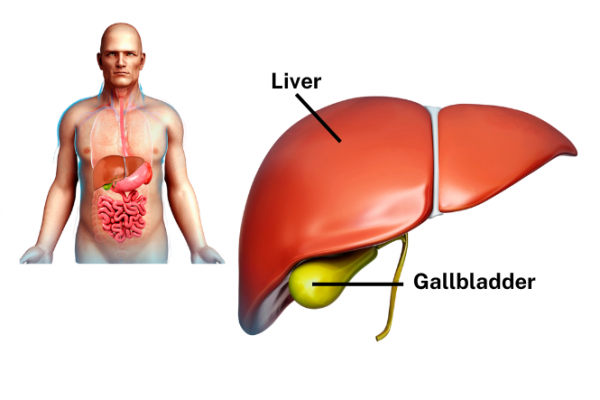Liver function tests
Also called LFTs or hepatic function panel
Key points about liver function tests
- A liver function test (LFT) is a blood test that measures the levels of several substances (chemicals and proteins) produced by your liver.
- It's a blood test that can provide information about how well your liver is working and if it's under stress.
- It may be done to test for liver disease, monitor you if you have liver disease, find out how well a treatment is working and monitor medicine side effects.

The liver is a large organ in the upper right of your abdomen that's necessary for many different functions. For example, it processes drugs and alcohol, filters toxic chemicals, stores vitamins and minerals, and proteins and enzymes and bile) which helps digest fat from your diet).

Image credit: Canva
Liver function tests (LFTs) are a group of tests performed on a single blood sample to find out how well your liver is working. The test measures the levels of a number of proteins and chemicals, called enzymes, in your blood. These enzymes and proteins may be produced by liver cells or released into the blood when liver cells are damaged or when the flow of bile through your liver is blocked. The pattern of abnormalities can give help find the cause of tummy pain or liver problems.
Liver function tests measure the levels of different enzymes and proteins excreted by your liver, such as:
- enzymes in your liver:
- alanine aminotransferase (ALT)
- alkaline phosphatase (ALP)
- aspartate aminotransferase (AST)
- gamma-glutamyl transferase (GGT)
- bilirubin – a breakdown product of red blood cells that is excreted by your liver
- albumin – the main type of protein that your liver makes
- total protein – the total amount of different proteins in your body.
Video: What your liver function test results can show
A liver function test isn't done routinely but may be done to identify damage or inflammation in your liver. Your healthcare provider may ask for this test to be done to:
- screen for potential liver problems such as fatty liver and viral hepatitis
- help in the diagnosis of other conditions such as gallstones
- monitor the ongoing development and severity of liver disease and to determine how well a treatment is working
- monitor side effects if you're taking prescription or non-prescription medicines that can affect liver functioning.
Your healthcare provider might order LFTs if you have:
- jaundice (yellowed skin) or dark urine or light-coloured bowel motions (poo)
- weakness or tiredness
- loss of appetite
- nausea (feeling sick) and vomiting (being sick)
- abdominal (tummy) pain or swelling
- itching.
Generally, you won't need to do anything before having this test. It can be done at any time of the day. Some medicines may affect the test so tell your healthcare provider about all prescription and non-prescription medicines (eg, herbal products, supplements and rongoā Māori) you take.
An LFT is a blood test which means a small amount of blood is taken through a needle placed in a vein in your arm. An elastic band is wrapped around your upper arm. It may feel tight for a few seconds. You may feel nothing at all from the needle, or you may feel a small brief sting or pinch. The blood sample is collected in a tube, which is sent to the laboratory for analysis. Read more about blood tests.
Interpreting liver function test results is complicated and is best done in consultation with your healthcare team. Your healthcare provider will look at the pattern of abnormalities and combine that with your signs and symptoms to make a diagnosis. Often the test will need to be repeated to see if there's a pattern over time.
The enzymes and proteins are divided into different categories which are used to help find the cause of any abnormal results.
Liver enzymes and proteins
Aminotransferases
- These are alanine aminotransferase (ALT) and aspartate aminotransferase (AST).
- Some labs don’t measure AST routinely because ALT is more specific to the liver.
- These enzymes are usually stored inside liver cells. However, when liver cells are damaged they're released into the blood stream resulting in increased levels.
- Common causes of raised levels are fatty liver due to obesity, alcohol, viral hepatitis and medications.
- Rarer causes are the genetic condition haemochromatosis and certain autoimmune diseases.
Gamma-glutamyl transferase (GGT) and Alkaline phosphatase (ALP)
- These are more specific to cholestasis. Cholestasis refers to the reduction of the flow of bile through the liver.
- This can be due to alcohol (usually just GGT elevated), gallstones and medications.
- Rarer causes are cancer and certain autoimmune conditions.
Bilirubin
- Bilirubin is produced during the normal breakdown of red blood cells.
- Raised levels can lead to jaundice (yellow skin).
- There are a large number of causes of raised levels.
- If the other tests are normal and bilirubin is only mildly elevated the most common cause is a harmless condition called Gilbert syndrome.
Albumin
- Albumin is the most common protein in the bloodstream and it's produced by the liver.
- One cause of low albumin is when the liver isn’t able to keep up with production.
- This can mean severe liver disease, but poor nutrition, or severe illness are other common causes.
- Your healthcare provider may also do a coagulation test called an INR because the liver also produces clotting factors (to make blood clots).
Liver function tests have some limitations. Abnormal values can be due to conditions not related to the liver. For example, ALP is also found in bone, and may be raised in bone-related problems. Also, people with very severe liver disease may have normal levels.
You should discuss your results with your healthcare provider. If you otherwise feel generally well, the most common causes for elevated liver function tests are alcohol consumption and fatty liver. Your healthcare provider may recommend you reduce the amount of alcohol you drink, maintain a healthy weight, stop smoking, exercise regularly and eat a healthy balanced diet. The test can be repeated in a few months to monitor your progress.
Resources
Understanding your liver function tests(external link) HealthInfo, NZ
References
- Liver function tests(external link) Mayo Clinic, US, 2023
- Understanding your liver function tests(external link) HealthInfo, NZ, 2022
Liver function tests in primary care(external link) BPAC, NZ, 2023
Liver function tests (LFTs) – B-QuiCK(external link) BPAC, NZ, 2024
Credits: Healthify editorial team. Healthify is brought to you by Health Navigator Charitable Trust.
Reviewed by: Dr Art Nahill, Consultant General Physician and Clinical Educator
Last reviewed:





